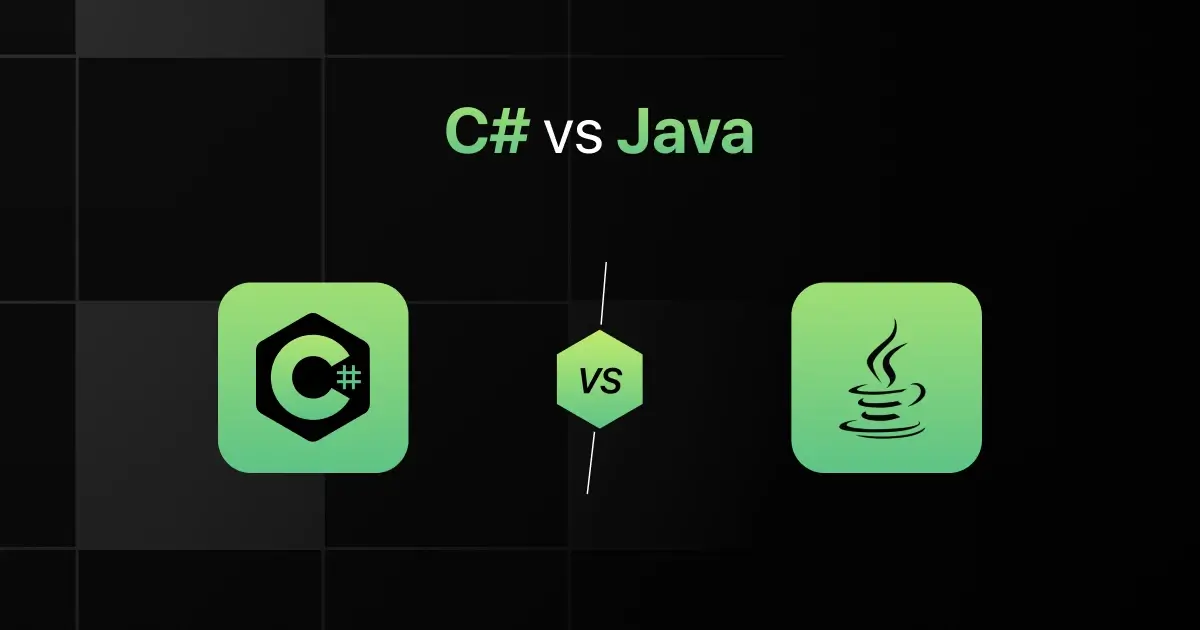When comparing C# and Java, looking at what sets them apart is important. The discussion about C# vs Java is common among programmers deciding which language to use for their projects.
The question of C# vs Java which is better? or C# vs Java which is best? depends on what you need for your specific project.
In this article, let’s know the differences between C# and Java.
C# vs Java: Understanding the Key Differences
When comparing C# and Java, it’s crucial to understand the key distinctions that define their usage and capabilities.
One of the most important differences is that C# is primarily used for developing Windows applications and game development with Unity. In contrast, Java is widely used for enterprise applications, Android development, and large-scale systems.
The following are other major differences between C# and Java:
| S. No. | Parameters | C# | Java |
|---|---|---|---|
| 1 | Developed By | Microsoft | Sun Microsystems (now owned by Oracle) |
| 2 | Release Year | 2000 | 1995 |
| 3 | Paradigm | Object-oriented, component-oriented | Object-oriented, class-based |
| 4 | Syntax | Similar to C++ with some improvements | Similar to C++ with some differences |
| 5 | Performance | Comparable, with better optimization on Windows | Comparable, with consistent cross-platform performance |
| 6 | Applications and Use Cases | Windows applications, game development (Unity) | Enterprise applications, Android development |
| 7 | Learning Curve | Moderate | Moderate |
| 8 | Libraries and Frameworks | Extensive .NET libraries, Xamarin | Extensive libraries, Spring, Hibernate |
| 9 | Platform Independence | Achieved with .NET Core | Achieved through JVM |
| 10 | Concurrency and Multithreading | Advanced support, async/await keywords | Advanced support, concurrency package |
| 11 | Tooling and IDE Support | Visual Studio, Visual Studio Code | IntelliJ IDEA, Eclipse, NetBeans |
| 12 | Memory Management | Automatic garbage collection, pointers support | Automatic garbage collection |
| 13 | Error Handling | Exception handling similar to C++ | Robust exception handling |
| 14 | Security | Strong security features in .NET framework | Strong security features built into JVM |
| 15 | Scalability | Highly scalable within the Windows ecosystem | Highly scalable in cross-platform environments |
| 16 | Key Features | Properties, events, LINQ, async/await | Portability, robustness, WORA (Write Once, Run Anywhere) |
| 17 | Integration with Other Technologies | Excellent integration with Microsoft products and services | Wide integration with various platforms and technologies |
| 18 | Community and Support | Strong community, extensive Microsoft support | Large global community, extensive support from Oracle |
| 19 | Job Opportunities | Strong in Windows-centric and game development | Strong in enterprise and Android development |
| 20 | Future Prospects | Continuously evolving with .NET advancements | Stable and evolving, strong in enterprise applications |
C# vs Java: Which One to Choose?
Choosing between C# and Java can be challenging, but by understanding their distinct advantages, you can make an informed decision.
Choose C# If:
- You aim to work in environments that primarily utilize Microsoft technologies, such as game development with Unity, desktop applications with .NET, or web applications using ASP.NET.
- You appreciate a language that is tightly integrated with the .NET framework, offering a vast range of libraries and tools for building everything from mobile apps to large enterprise systems.
- You value a language that provides excellent support for both Windows-based and web-based applications, with strong capabilities in GUI design and event-driven programming.
- You seek a language that facilitates development across multiple platforms with the .NET Core, enabling efficient application development on Linux and macOS in addition to Windows.
- You focus on building applications that benefit from robust integration with Windows operating systems or developing games and VR experiences using Unity, where C# is the primary programming language.
Choose Java If:
- You aim to work as a backend developer, mobile app developer (especially Android), or in enterprise-level systems, particularly in industries that value platform independence and robust security features.
- You seek a language with a comprehensive set of libraries and frameworks, such as Spring for enterprise applications and JavaFX for desktop applications, that are critical for building scalable and maintainable systems.
- You value a language known for its strong performance and memory management capabilities, making it ideal for high-load and large-scale applications.
- You need a universally compatible language that supports a wide range of platforms from enterprise servers to mobile operating systems through its Java Virtual Machine (JVM).
- You focus on developing large-scale enterprise systems, Android applications, and complex server-side technologies, where Java’s reliability and scalability are critical for success.
Final Words
The main difference between C# and Java lies in their design and use.
The purpose of understanding the C# vs Java difference is to choose the right tool for the job, depending on factors like the project’s size and how easy it is to maintain.
Frequently Asked Questions
1. What are the key differences between C# and Java?
Here are the key differences between C# and Java:
- C# is tightly integrated with the Windows platform, while Java is designed for cross-platform compatibility through the JVM.
- C# is part of the .NET ecosystem, providing extensive support for Windows development; Java is supported by a vast ecosystem suitable for enterprise and Android development.
- C# includes features like properties and events that are not natively available in Java.
- C# is often used for Windows applications and game development with Unity, while Java is widely used for enterprise applications and Android development.
2. Which is better C# or Java? Which one to choose?
The choice depends on your project needs C# for Windows and game development, Java for cross-platform and enterprise applications.









